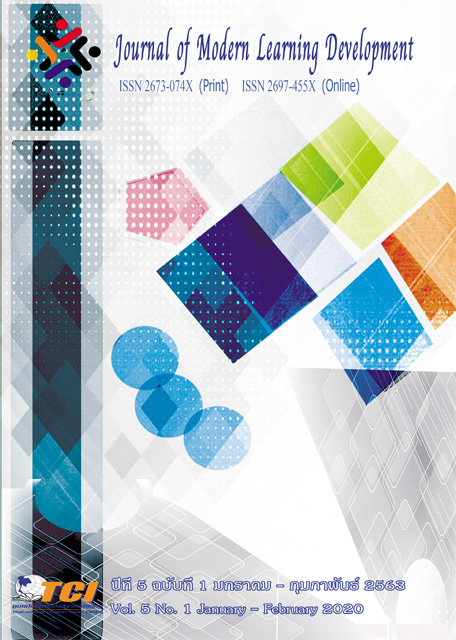Learning Management by Using The Four Iddhipada DoctrinceIn The 21st Century of Students at Banphaiphitthayakhom School, Banphai District,Khonkaen Province
Main Article Content
Abstract
The aims of this research were: 1) to study the problems and the need for learning management by using the four Iddhipada Dhamma principles (iddhipāda, path of accomplishment) in the 21st century of students at Ban Phai Phitayakhom school, Ban Phai district, Khon Kaen province; 2) to study the learning management model by using the four Iddhipada Dhamma principles of the 21st century of the mentioned students; 3) to present the model and guidelines for organizing the learning by using the four Iddhipada Dhamma principles in the 21st century of the students. The study was carried out by means of the mixed research methodology. For the quantitative research, a questionnaire was used to collect data from 207 high school students (4-6 years), selected by using Taro Yamane's formula. The 136 samples were obtained by their class levels. For the quantitative research, the in-depth interview was used to gather information from the target group, consisting of 6 teachers, selected by purposive sampling. The statistics used in data analysis were: Percentage, Mean and Standard Deviation.
The research results were as follows:
The level of opinions towards the problems and the need for learning management by using the four Iddhipada Dhamma principles in the 21st century of the students was in the highest level. When considering each aspect, it was found that the opinion levels of all studied aspects were at a high level of practice, ranked in descending order, namely, aspect 5: the use of the four Iddhipada Dhamma principles to the community, followed by aspect 1: the use of the four Iddhipada Dhamma principles to education; aspect 4: the use of the four Iddhipada Dhamma principles to the school; aspect 2: the use of the four Iddhipada Dhamma principles on the behavior of a good person; aspect 3: the use of the four Iddhipada Dhamma principles to family.
A model of the learning management by using the four Iddhipada Dhamma principles in the 21st century of the students can be concluded that the use of the four Iddhipada Dhamma principles as inputs in the learning management process results in making the students understand the application of the four Iddhipada Dhamma principles in education, self-behavior, family, school and community through the analytical thinking process which is considered as a living skill in the 21st century.
The suggestions for the study of the learning management by using the four Iddhipada Dhamma principles in the 21st century of the students are as follows. In using the four Iddhipada Dhamma principles in education, the students should be very satisfied with what they are studying and pay attention to. In using the four Iddhipada Dhamma principles on behavior, the students should be grateful to benefactors as the first step because it will make students step into good behavior in all matters. In using the four Iddhipada Dhamma principles to the family, the activities that build relationships, love and understanding in family should be created. In using the four Iddhipada Dhamma principles to schools, there should be activities that encourage students to help the school and help each other take responsibility for the school. In using the four Iddhipada Dhamma principles to the community, the behavior of students in the community should be monitored in terms of helping community or society.
Article Details
References
คมเพชร ฉัตรศุภกุล. (2546). กิจกรรมกลุ่มในโรงเรียน. กรุงเทพมหานคร: แสงรุ้งการพิมพ์
ทิพยวรรณ กิตติพร. (2535). การให้คำปรึกษากลุ่ม. พิษณุโลก: มหาวิทยาลัยนเรศวร.
พระมหาสมคิด โครธา (2547). การใช้อิทธิบาท 4 ในการเรียนของพระนิสิตมหาวิทยาลัยมหาจุฬาลงกรณราชวิทยาลัย. คณะศึกษาศาสตร์ ภาควิชาหลักสูตรและการสอน.บัณฑิตวิทยาลัย: มหาวิทยาลัยศรีนครินทรวิโรฒ.
พุทธทาสภิกขุ.(2557). ศึกษาธรรมะอย่างถูกวิธี. ออนไลน์. สืบค้นเมื่อ 10 มกราคม 2557. แหล่งที่มา : http://www.buddhadasa.com/rightstudydham/itbath4.html
ลักขณา สริวัฒน์. (2560). การประยุกต์ใช้อิทธิบาท 4 ในการจัดการเรียนรู้ที่เน้นผู้เรียนเป็นสำคัญของครูระดับประถมศึกษา.ศณะศึกษาศาสตร์ ภาควิชาจิตวิทยาและการแนะแนว. บัณฑิตวิทยาลัย: มหาวิทยาลัยมหาสารคาม.
วรพจน์ วงศ์กิจรุ่งเรือง. (2554). ทักษะแห่งอนาคตใหม่ : การศึกษาเพื่อศตวรรษที่ 21.กรุงเทพมหานคร : สำนักพิมพ์ Open Worlds.
สุทธิพงษ์ ศรีวิชัย. (2550). หลักการบริหารการศึกษาตามแนวพุทธศาสตร์. กรุงเทพมหานคร: โรงพิมพ์จุฬาลงกรณราชวิทยาลัย.


